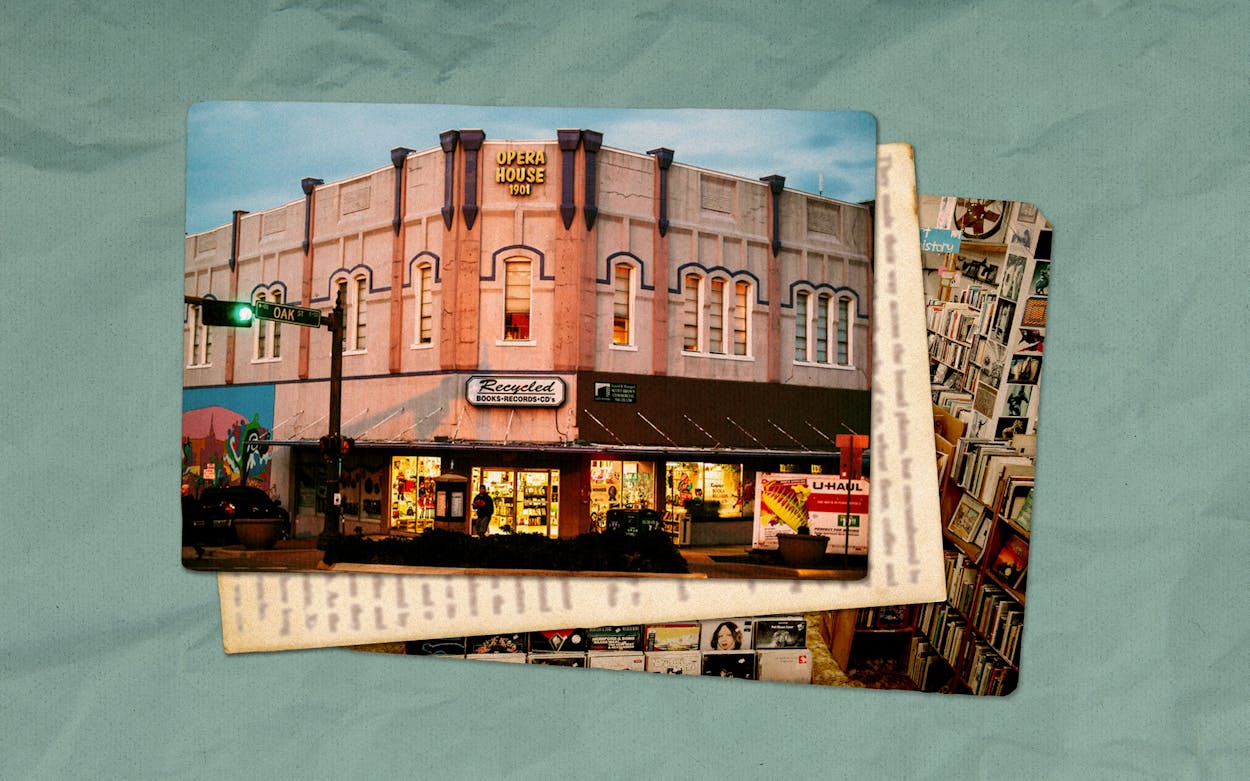Used books are a great deal, and not just because they’re cheaper than new books. There’s a lot more to their value than what’s accounted for in the price penciled onto the right-hand corner of that blank page before the title page. They come with bonus material: the scribbles, the underlining, the grocery list bookmarks, the forgotten old photos tucked between pages. At a used bookstore, you can get a cheap paperback and free ephemera, courtesy of the readers who’ve released their unwanted volumes back into the marketplace.
If you examine their scrawls and doodles, you’ll discover an anonymous community that views books not merely as precious objects but as tools and journals and hiding places. I once desperately needed that community, even if I didn’t know it at the time. And Recycled Books, Records, & CDs, in Denton, helped me find it. All great used bookstores can.
Recycled occupies three sprawling, creaking floors that originally housed a vaudeville theater. Although it’s situated catty-corner from Denton’s historic Courthouse-on-the-Square—a classic of the Romanesque revival courthouses all over the state—Recycled’s 1899 building stood out architecturally even before it was painted purple in 1998. You’ll find history, sports, and travel in the basement. Philosophy, science, art, a truly impressive collection of rare books, and much more are on the main floor. But I always walk past all that.
My destination, from my first visit to my (and this an estimate) 14,000th and counting, is the literature section in a loft space at the top of a creaky set of stairs. For a college sophomore who had an impulse to read books but was never taught to see books as anything other than assignments, it felt immediately like the highest point in Texas. A kind of sanctuary and retreat.
I’m an editor at Texas Monthly now, but at the time I started at the University of North Texas, I had read only one book that wasn’t for a class assignment. That was The Grapes of Wrath, during a bout of strep in high school. I didn’t know people who consumed books outside of their required reading. Until, at Recycled, I found evidence that they existed all around me.
I always scanned the store’s shelves the same way. I’d peruse the hardcovers quickly—A to Z, by author. Then I’d move to the paperbacks. On my repeated visits, I’d see not just familiar titles, but familiar volumes that lingered unsold on the shelves. The Letters of Thomas Wolfe, missing a back cover. Ten or so copies of John Kennedy Toole’s A Confederacy of Dunces. A curiously large number of “B” authors: lots of James Baldwin, loads of Emily Brontë, seemingly all of Anthony Burgess’s lesser works. Plus the classics, of course. Thucydides. Sappho. Euripides. Aristophanes. Montaigne. Orwell. Melville. Hawthorne. Cindy.
What, you haven’t read Cindy? The writings of Cindy changed my life. The best thing I ever read of hers was in “Roger Malvin’s Burial,” the first story in a 1980 paperback edition of The Celestial Railroad and Other Stories, by Nathaniel Hawthorne.
Just below the story’s line “And he hastened away, leaving her to watch the fire beneath the gloomy pines,” Cindy wrote, in blue ink, “Hope it doesn’t happen to us.”
Hope what doesn’t happen to us, Cindy?
Or maybe she meant, “Hope—it doesn’t happen to us.” Or “Hope—it doesn’t happen to us.”
The point is, Cindy was moved enough to make an assertion. Or just copy an assertion being made by her English professor, but still.
In other books, on other trips, I encountered inscriptions by the likes of Eric, Sheila, Sheldon, and Lisa. Plus from dozens of others who felt compelled to put their names, and sometimes their phone numbers, into their books. They dog-eared pages and highlighted entire paragraphs and left me incidental gifts—like receipts or clipped newspaper obituaries they had used as bookmarks.
I never met them, but these were my people. They validated my decision to hang out in my studio apartment on a beautiful fall Saturday and read The Last Picture Show cover to cover. Or to continuously have twenty books in a teetering stack on my nightstand. Or to have absolutely no idea what Ezra Pound was saying in the way-loftier-than-the-title-suggests ABC of Reading, but to want to finish the book anyway. All those question marks in the margins assured me that I wasn’t alone.
For your next book, go used. Really used. Head to Recycled, in Denton; or Literarity, in El Paso; or Cheever, in San Antonio; or Good Books in the Woods, in Spring; or Lucky Dog, in Dallas; or Kaboom, in Houston, and buy the most marked-up volume you can find. Connect with those who held and read the book before you. You don’t want the stuff that people got for Christmas and immediately sold. You want the cracked spines and the bent pages. You want the books in “fair” condition. Fair is beautiful. Savor it, then sell it back, but before you do, consider leaving a message of hope in the margins.
- More About:
- Books
- Indie Bookstore Week
- Denton








